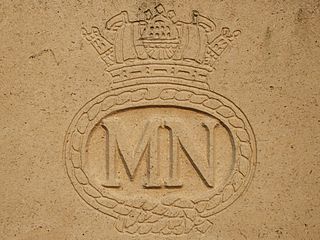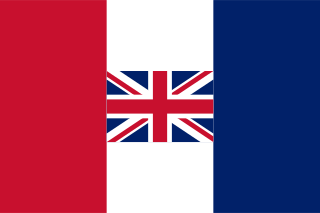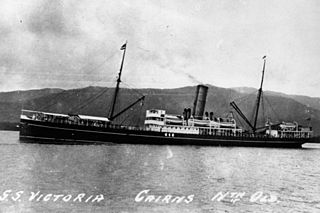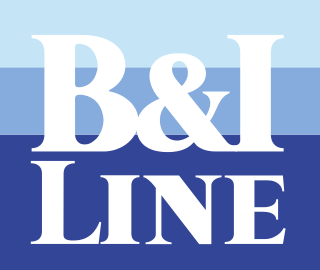Related Research Articles

Cunard Line is a British shipping and cruise line based at Carnival House at Southampton, England, operated by Carnival UK and owned by Carnival Corporation & plc. Since 2011, Cunard and its three ships have been registered in Hamilton, Bermuda.

The British Merchant Navy is the collective name given to British civilian ships. In the UK, it is simply referred to as the Merchant Navy or MN. Merchant Navy vessels fly the Red Ensign and are regulated by the Maritime and Coastguard Agency (MCA). King George V bestowed the title of "Merchant Navy" on the British merchant shipping fleets following their service in the First World War; a number of other nations have since adopted the title. Previously it had been known as the Mercantile Marine or Merchant Service, although the term "Merchant Navy" was already informally used from the 19th century.
Several ships have been named Innisfallen, the name being derived from the island of Innisfallen in County Kerry and often given to vessels serving the southerly coasts of Ireland. Five served on the Irish Sea route between Cork and Fishguard, from 1896 onwards: two of these were war casualties whilst the remainder have been either scrapped or renamed and sold to new owners.

CP Ships was a large Canadian shipping company established in the 19th century. From the late 1880s until after World War II, the company was Canada's largest operator of Atlantic and Pacific steamships. Many immigrants travelled on CP ships from Europe to Canada. In 1914 the sinking of the Canadian Pacific steamship RMS Empress of Ireland just before World War I became largest maritime disaster in Canadian history. The company provided Canadian Merchant Navy vessels in World Wars I and II. Twelve vessels were lost due to enemy action in World War II, including the RMS Empress of Britain, which was the largest ship ever sunk by a German U-boat.

P Henderson & Company, also known as Paddy Henderson, was a ship owning and management company based in Glasgow, Scotland and operating to Burma. Patrick Henderson started business in Glasgow as a merchant at the age of 25 in 1834. He had three brothers. Two were merchants working for an agent in the Italian port of Leghorn; the third, George, was a sea captain with his own ship.

The City of Dublin Steam Packet Company was a shipping line established in 1823. It served cross-channel routes between Britain and Ireland for over a century. For 70 of those years it transported the mail. It was 'wound-up' by a select committee of the House of Lords in 1922 and finally liquidated in 1930.
The Collins Line was the common name for the American shipping company started by Israel Collins and then built up by his son Edward Knight Collins, formally called the New York and Liverpool United States Mail Steamship Company. Under Edward Collins' guidance, the company grew to be a serious competitor on the transatlantic routes to the British Cunard shipping company.

The Pacific Steam Navigation Company was a British commercial shipping company that operated along the Pacific coast of South America, and was the first to use steam ships for commercial traffic in the Pacific Ocean.

Furness Withy was a major British transport business. It was listed on the London Stock Exchange.

The Royal Mail Steam Packet Company was a British shipping company founded in London in 1839 by a Scot, James MacQueen. The line's motto was Per Mare Ubique. After a troubled start, it became the largest shipping group in the world in 1927 when it took over the White Star Line. The company was liquidated and its assets taken over by the newly formed Royal Mail Lines in 1932 after financial trouble and scandal; over the years RML declined to no more than the name of a service run by former rival Hamburg Süd.

SS Sirius was a wooden-hulled sidewheel steamship built in 1837 by Robert Menzies & Sons of Leith, Scotland for the London-Cork route operated by the Saint George Steam Packet Company. The next year, she opened transatlantic steam passenger service when she was chartered for two voyages by the British and American Steam Navigation Company. By arriving in New York a day ahead of the Great Western, she is usually listed as the first holder of the Blue Riband, although the term was not used until decades later.

The British and Irish Steam Packet Company Limited was a steam packet and passenger ferry company operating between ports in Ireland and in Great Britain between 1836 and 1992. It was latterly popularly called the B&I, and branded as B&I Line.

The Baltimore Steam Packet Company, nicknamed the Old Bay Line, was an American steamship line from 1840 to 1962 that provided overnight steamboat service on Chesapeake Bay, primarily between Baltimore, Maryland, and Norfolk, Virginia. Called a "packet" for the mail packets carried on government mail contracts, the term in the 19th century came to mean a steamer line operating on a regular, fixed daily schedule between two or more cities. When it closed in 1962 after 122 years of existence, it was the last surviving overnight steamship passenger service in the United States.

The Great Western Steam Ship Company operated the first regular transatlantic steamer service from 1838 until 1846. Related to the Great Western Railway, it was expected to achieve the position that was ultimately secured by the Cunard Line. The firm's first ship, Great Western was capable of record Blue Riband crossings as late as 1843 and was the model for Cunard's Britannia and her three sisters. The company's second steamer, the Great Britain was an outstanding technical achievement of the age. The company collapsed because it failed to secure a mail contract and Great Britain appeared to be a total loss after running aground. The company might have had a more successful outcome had it built sister ships for Great Western instead of investing in the too advanced Great Britain.

RMS Magdalena was a British steamship that was built in 1889 as a Royal Mail Ship and ocean liner for the Royal Mail Steam Packet Company. In the First World War she served as the troop ship HMT Magdalena. After a long and successful civilian and military career she was scrapped in 1923.
Counties Ship Management Co. Ltd. (CSM) was an ocean-going merchant shipping company based in the United Kingdom. During the Second World War CSM merchant ships made a substantial contribution to supplying the British war effort, at a cost of 13 ships lost and 163 officers and men killed.

HMAS Grantala was a passenger steamship that was built in England in 1903 as a coastal interstate liner for the Adelaide Steamship Company. In 1914 the Commonwealth government requisitioned her as a Royal Australian Navy hospital ship.
The Alderney Steam Packet Company provided shipping services between Alderney and Sark, Guernsey and Cherbourg from 1897 to 1931.
The Belfast Steamship Company provided shipping services between Belfast in Ireland and Liverpool in England from 1852 to 1975.

Irish Willow was one of the few ships which maintained Irish trade during World War II.
References
Notes
- ↑ Sea breezes: the ship lovers' digest: 1949
- ↑ A business of national importance: the Royal Mail Shipping Group, 1902-1937 By Edwin Green, Michael S. Moss
- ↑ UK Retail Price Index inflation figures are based on data from Clark, Gregory (2017). "The Annual RPI and Average Earnings for Britain, 1209 to Present (New Series)". MeasuringWorth. Retrieved 11 June 2022.
- ↑ "Shipping Lines: Royal Mail Steam Packet Company". Archived from the original on 10 June 2013. Retrieved 31 December 2010.
{{cite web}}: CS1 maint: unfit URL (link) - ↑ Moss, Michael S. (23 September 2004). "Read, Sir Alfred Henry (1871–1955), shipowner" . Oxford Dictionary of National Biography (online ed.). Oxford University Press. doi:10.1093/ref:odnb/47431. ISBN 978-0-19-861412-8 . Retrieved 18 May 2022.(Subscription or UK public library membership required.)
- ↑ 'The world's largest coaster fleet', Sea Breezes, E.R. Reader, February 1949.
Bibliography
- Robins, Nick; MacRonald, Malcolm (2017). Powell, Bacon and Hough: Formation of Coast Lines Limited. Portishead, Bristol: Coastal Shipping Publications. ISBN 9781902953816.
